
African Journal of Information Systems
Scope & Guideline
Catalyzing Collaboration for Sustainable Solutions.
Introduction
Aims and Scopes
- Information Technology Governance:
The journal emphasizes the importance of effective governance frameworks that guide the deployment and integration of information technology in various sectors, particularly in educational institutions and government. - Social Media and Digital Communication:
Research in this area focuses on how organizations and individuals leverage social media platforms for engagement, privacy concerns, and information dissemination, reflecting the dynamic role of digital communication in society. - Health Information Systems:
The journal explores the development and implementation of health information systems, particularly in low-income countries, addressing challenges such as interoperability and cybersecurity in healthcare. - Education and Technology Integration:
This area examines the use of technology in educational settings, including the adoption of online learning platforms and the incorporation of computational thinking in curricula, aiming to enhance learning outcomes. - Entrepreneurship and Innovation:
The journal highlights the role of digital technologies in reshaping entrepreneurship and innovation processes, focusing on how these tools can drive economic development in African contexts. - Cybersecurity Awareness and Practices:
Research on cybersecurity addresses the attitudes and behaviors of users, particularly in educational environments, reflecting the need for improved awareness and practices related to online security.
Trending and Emerging
- Crisis Management and ICT:
The journal has seen an increase in studies examining the role of information and communication technologies in crisis management, particularly in the context of the COVID-19 pandemic, showcasing the critical nature of technology during emergencies. - Data Privacy and Security:
There is a rising emphasis on privacy perceptions and data security, highlighting the importance of understanding users' attitudes towards data breaches and privacy in an increasingly digital world. - Innovative Educational Technologies:
Research focusing on innovative technologies in education, such as mobile instant messaging for tutoring and the integration of computational thinking in curricula, is emerging as a key area of interest. - Social Media Analytics:
The application of social media analytics in both governmental and private sectors is becoming increasingly relevant, reflecting the growing importance of data-driven decision-making in stakeholder engagement. - Health Technology and mHealth Solutions:
There is a notable trend towards exploring mobile health (mHealth) solutions and their implementation in healthcare systems, particularly in low-income countries, emphasizing the need for accessible health information.
Declining or Waning
- Traditional Information Systems Methodologies:
There has been a noticeable decrease in research focusing solely on traditional information systems methodologies, possibly as the field evolves to incorporate more agile and adaptive frameworks. - Internet Regulation and User Privacy:
Although still relevant, the frequency of research specifically addressing the regulation of user privacy in the context of emerging internet technologies has waned, suggesting that scholars may be moving towards more practical applications rather than regulatory discussions. - General E-Government Initiatives:
While e-government remains a crucial theme, there appears to be a decline in studies specifically focused on broad e-government initiatives, with a shift towards evaluating specific projects or frameworks instead. - Mobile Technology Adoption in Isolation:
Research that examines mobile technology adoption without considering its integration with other digital platforms or services is becoming less common, reflecting a trend towards more holistic approaches.
Similar Journals
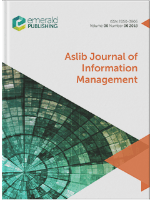
Aslib Journal of Information Management
Elevating Research Standards in Library and Information SciencesThe Aslib Journal of Information Management, published by Emerald Group Publishing Ltd, stands as a vital resource within the field of library and information sciences, enjoying a prominent position in the academic landscape with an impressive 2023 impact factor. This journal embraces a wide-ranging scope that encompasses innovative research, practical applications, and theoretical advancements in information management. Reflecting its exceptional quality, it has achieved a Q2 ranking in Information Systems and a distinguished Q1 ranking in Library and Information Sciences as of 2023. With its Scopus rankings placing it in the 83rd percentile for Library and Information Sciences, the journal is a leading platform for both scholars and practitioners seeking to advance knowledge in the discipline. The journal is committed to open access, fostering greater visibility and accessibility of research outputs. As it converges on its tenth anniversary (2014-2024), the Aslib Journal of Information Management continues to be an essential tool for researchers, professionals, and students eager to navigate the rapidly evolving landscape of information management.

African Journal of Library Archives and Information Science
Navigating the Future of Library Science in Africa.The African Journal of Library Archives and Information Science (ISSN: 0795-4778; E-ISSN: 0795-4778) is a pivotal publication in the field of Library and Information Sciences, published by ARCHLIB & INFORMATION SERVICES LTD in Nigeria. With a focus on the diverse and evolving challenges faced by libraries and information professionals in the African context, this journal serves as a platform for scholarly communication, fostering innovation and collaboration among researchers, practitioners, and academics. The journal has a notable impact factor, reflected in its Q3 ranking within the category for 2023, and is indexed in Scopus, holding a percentile rank of 22nd in its field, further validating its relevance and scholarly contribution. Running since 2008 with continual publications through to 2024, the journal aims to advance knowledge, share best practices, and highlight emerging trends in librarianship and information science across Africa and beyond. By offering open access options, it ensures wide dissemination of knowledge, making it an essential resource for those dedicated to enhancing information services and archives.
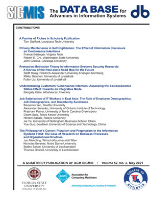
DATA BASE FOR ADVANCES IN INFORMATION SYSTEMS
Connecting Research and Practice in Information SystemsDATA BASE FOR ADVANCES IN INFORMATION SYSTEMS, published by the Association for Computing Machinery, is a pivotal journal in the field of information systems, offering a platform for researchers and professionals to disseminate innovative findings and emerging trends. With its ISSN 0095-0033, this journal encompasses a broad spectrum of topics including data management, information retrieval, and systems architecture, making it a vital resource for scholars and practitioners keen on advancing knowledge in these areas. Although not an Open Access journal, it remains accessible through various academic institutions and libraries, maintaining its reputation as a cornerstone of scholarly communication. By fostering academic discourse, DATA BASE FOR ADVANCES IN INFORMATION SYSTEMS is committed to enhancing the quality and impact of research in the information systems domain, aiming to inspire the next generation of professionals and researchers.
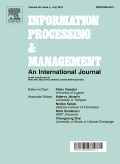
INFORMATION PROCESSING & MANAGEMENT
Shaping the Future of Information Management PracticesINFORMATION PROCESSING & MANAGEMENT, published by ELSEVIER SCI LTD, is a distinguished journal at the forefront of research in the fields of Computer Science, Information Systems, Library and Information Sciences, and Management Science and Operations Research. Since its inception in 1975, this journal has continually evolved to provide a scholarly platform for the dissemination of innovative methodologies and frameworks in information processing. With a remarkable Q1 ranking across multiple disciplines and esteemed Scopus rankings—notably, 1st in Media Technology and 4th in Library and Information Sciences—it stands as a pivotal resource for researchers, professionals, and students alike, seeking to advance their understanding and application of information management principles. Although not an Open Access journal, it remains widely accessed and respected, marking its influence in shaping the future of effective information management practices. The journal is committed to providing a rigorous peer-review process, ensuring the publication of high-quality research that addresses current challenges and trends in information technology and its application in various sectors.
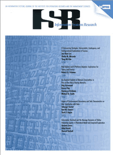
INFORMATION SYSTEMS RESEARCH
Cultivating excellence in information systems research since 1990.INFORMATION SYSTEMS RESEARCH, published by INFORMS, stands as a pivotal academic journal in the field of information systems and management. With a robust impact factor and consistently achieving Q1 quartile rankings across multiple categories—including Computer Networks and Communications, Information Systems, and Library and Information Sciences—it has established itself as a leading forum for innovative research and practical insights. The journal has been converging scholarly work since 1990, offering a rich repository for researchers, professionals, and students interested in the intersection of decision sciences and technology. While it operates under standard access options, its significant contributions to the field ensure that it remains a critical resource for advancing knowledge and fostering professional growth. Situated in the United States, INFORMATION SYSTEMS RESEARCH not only comprehensively addresses contemporary challenges in the domain but also influences best practices and strategic decision-making across various industries.
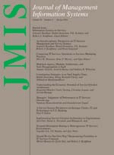
JOURNAL OF MANAGEMENT INFORMATION SYSTEMS
Shaping the future of management practices with pioneering studies.JOURNAL OF MANAGEMENT INFORMATION SYSTEMS, published by Routledge Journals, Taylor & Francis Ltd, stands as a leading scholarly platform in the domains of Information Systems and Management Science. With its ISSN 0742-1222 and E-ISSN 1557-928X, this esteemed journal has maintained a robust presence since its inception in 1987, showcasing cutting-edge research until 2024. Recognized for its high impact, it holds a Q1 ranking in various categories including Computer Science Applications and Management Information Systems, highlighting its influence and significance in the field. The journal caters to a diverse audience of researchers, professionals, and students by offering critical insights and analyses that address contemporary challenges and innovations in management information systems. Despite being a subscription-based journal, it remains at the forefront of academic excellence, driving meaningful discourse and fostering collaboration among scholars and industry experts. Engage with JOURNAL OF MANAGEMENT INFORMATION SYSTEMS to explore pioneering studies that shape the future of management practices and information technology.
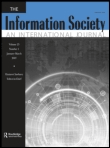
INFORMATION SOCIETY
Transforming Understanding of Information's Role in SocietyINFORMATION SOCIETY, published by Taylor & Francis Inc, stands at the forefront of interdisciplinary inquiry, bridging the realms of cultural studies, information systems, and political science since its inception in 1981. With a commendable impact factor and recognized as a Q1 journal in multiple categories, including Cultural Studies and Management Information Systems, it serves as a pivotal platform for researchers, professionals, and students seeking insights into the ever-evolving dynamics of information in society. The journal, indexed by Scopus and ranked highly in various disciplines, not only highlights key theoretical developments but also addresses applied practices in information management within cultural and political contexts. While access is subscription-based, the journal’s impact and relevance ensure it remains essential reading for those engaged in the critical exploration of information's role in contemporary and future societies.

Journal of Information Policy
Empowering Scholars to Shape Information GovernanceThe Journal of Information Policy is a premier academic publication endorsed by PENN STATE UNIV PRESS that has been championing open access research since 2011. Dedicated to advancing the field of information policy, this peer-reviewed journal plays a pivotal role in disseminating scholarly work at the intersection of communication, public administration, sociology, and political science. With an impressive Editorial Board and a focus on contemporary issues regarding information governance, access, and policy implications, the journal holds substantial rankings within various disciplines, including Q2 in Communication and Sociology and Political Science, as well as Q3 in Public Administration as of 2023. It boasts a solid reputation in academic circles, ranking #210 in Communication, #570 in Sociology, and #135 in Public Administration within Scopus. With its commitment to fostering knowledge sharing among researchers, professionals, and students, the Journal of Information Policy is essential for anyone looking to explore the dynamic landscape of information policy and its impact on society.

Electronic Journal of Information Systems in Developing Countries
Exploring the Intersection of Technology and EducationElectronic Journal of Information Systems in Developing Countries (ISSN: 1681-4835, E-ISSN: 1681-4835) is a pivotal resource for researchers and practitioners in the fields of Information Systems and E-learning, published by the reputable WILEY. Established in 2000 and continuing through 2024, this journal aims to bridge the gap between theory and practice in the context of developing nations, addressing critical issues related to technology adoption, education, and information systems implementation. Despite its Q3 ranking in both E-learning and Information Systems categories, it offers a platform for innovative research that contributes to the advancement of knowledge and practices in these areas. The journal is accessible to a diverse audience including professionals, researchers, and students, enabling them to stay abreast of the latest developments and trends. The Electronic Journal of Information Systems in Developing Countries is not only a key player within its niche but also a vital contributor to global discourse on the role of information systems in fostering sustainable development.
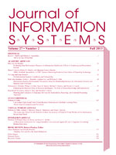
JOURNAL OF INFORMATION SYSTEMS
Shaping the Future of Accounting through Information TechnologyJOURNAL OF INFORMATION SYSTEMS is a prestigious academic journal published by the American Accounting Association, dedicated to advancing the field of information systems within the context of accounting and management. With an ISSN of 0888-7985 and an E-ISSN of 1558-7959, this journal has been a vital resource since its inception, now converging from 2009 to 2024. It boasts an impressive impact in several relevant categories, achieving Q2 status in fields such as Accounting, Information Systems, and Management Information Systems, showcasing its influence among peers. Moreover, it maintains a commendable ranking in various Scopus categories, including a rank of #69 in Accounting and #55 in Management Information Systems, placing it in the 61st and 58th percentile, respectively. Although it is not an open-access journal, the JOURNAL OF INFORMATION SYSTEMS remains an essential platform for researchers, professionals, and students aiming to explore case studies, theoretical insights, and practical applications in the dynamic field of information systems and technology management.